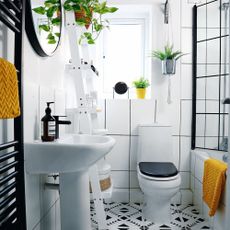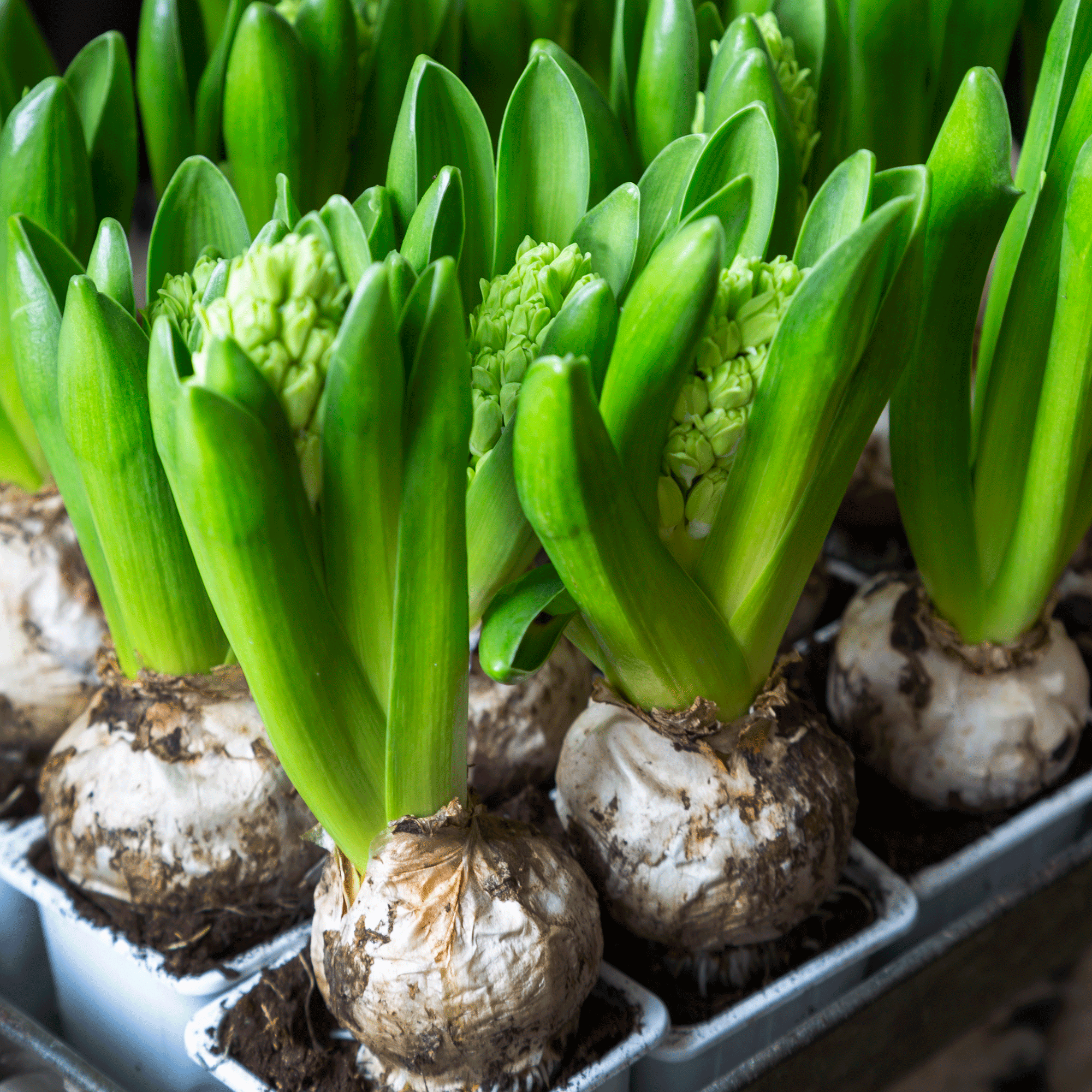Kitchen floor tile ideas – 10 ways to make flooring the focal point
Put your flooring in the spotlight with creative ideas and clever ways for using kitchen floor tiles

Stuck for kitchen floor tile ideas and inspiration? Deciding which floor treatment to go for in practical spaces like kitchens and utility rooms can be tricky. Choosing a kitchen flooring that is hard-wearing, durable and easy to keep clean is key, but you want flooring to look great too.
Tiles are top of the list, both in terms of style and practicality. Kitchen tile ideas are plentiful, whether it’s classic porcelain tiles in an elegant pattern, rustic country-style flag stones or punchy terrazzo tiles adding a bright pop of colour.
The colour and pattern you opt for will have a big impact on your kitchen too. Opt for bold shades and busy patterns if you want flooring to be the focal point, or stick to neutral tones and subtle patterns if you want flooring to blend in.
Kitchen floor tile ideas
‘Flooring is a key element to any room. As it’s unlikely to be changed for a long time once installed, it needs to suit the décor and be hardwearing, comfortable and practical,’ says Sarah Escott, Design Manager at Amtico. ‘Choosing the right floor for your home can be overwhelming, especially if you’re not quite sure what will work for you.’
1. Match floor and wall tiles in on-trend terrazzo

Add pizzazz to plain kitchen cabinets with on-trend terrazzo tiles bringing a splash of punchy colour. Matching floor and wall tiles creates a sleek seamless look throughout that will give flow to an open-plan kitchen-diner.
Terrazzo is a composite material made by mixing marble, granite, quartz or glass chips with a resin binder which creates a colourful fragmented effect. Ultra hardwearing and easy to wipe down, terrazzo tiles are a practical choice for kitchens and bathrooms.
Choose terrazzo floor tiles that complement your kitchen by matching the colour flecks to kitchen cabinets, work tops or kitchen splashback ideas for a fun colour co-ordinated look.
2. Go faux with rustic wood-effect floor tiles

A real wood floor is hard to beat, but when it comes to kitchen floor tile ideas, natural wood has its downsides. If real wood gets exposed to water, it can warp and buckle, so isn’t the most practical choice for kitchens or utility rooms.
The good news is that there are some pretty convincing alternatives that offer all the appeal of a natural wood floor, but with none of the disadvantages. Wood-effect tiles come in a wide range of colour choices and wood grain finishes, from blonde Scandi styles to warm and mellow dark woods.
Easy to lay, these plank-effect tiles are super hardwearing, easy to clean and can cope with splashes and spills without getting water-damaged. Lay plank-effect tiles lengthways as you would a real wood floor to mimic the look of timber floor boards.
3. Add character with an elegant pattern

Make your kitchen floor the focal point with a standout pattern taking centre stage. Be lead by the style of your kitchen or period of your home for inspiration, whether you opt for traditional Victorian geometric tiles or a modern chevron effect.
'One of the quickest shortcuts to a cohesive and chic design is to pick out one central colour with one or two accent shades to add depth,’ says Amanda Telford, Marketing Manager at CTD Tiles.
‘Choosing a patterned floor tile that picks out a central wall colour (or cabinet colour) will create a really stunning backdrop to your space, if your tile has several secondary colours it can also be really effective to mirror these in kitchen accessories.’
4. Go for all-over pattern in a small kitchen

Small-scale geometric patterns can create an illusion of depth that is perfect for small spaces, such as narrow galley kitchens or long, narrow hallways. Link floor and walls by extending the pattern and colour onto a tiled splashback for a more cohesive look.
‘Opting for boldly patterned floor tiles can create a unique look,’ says Paul Bangs, Head of Tiles and Flooring at Wickes. ‘In a small kitchen, pair patterned tiles with a lighter wall colour to make the space feel larger and more expansive.’
5. Beat the chill with luxury vinyl

Dark and dramatic, a natural slate floor is the perfect addition to a modern, country kitchen. The downside though, is that real slate can feel cold and hard and be unforgiving if china and glass is dropped on it accidentally.
LVT flooring (luxury vinyl tile) offers a compromise between real and fake, with realistic slate effect designs that feel warmer and less-harsh to the touch. High-end LVT flooring also comes in tile and plank formats that create a convincing layout that looks super authentic and much like the real thing.
‘When it comes to choosing the right colour for your home, it’s important to take into consideration the building’s age and the feel you want to create, as well as the size of the room you’re decorating, says Sarah Escott, Design Manager at Amtico. ‘Classical style products, such as distressed and reclaimed woods, tend to suit older properties or those spaces where you want a warmer, homely feel.’
‘When deciding on a laying pattern, scale is possibly the most critical factor. The size of the space and size of the pattern should be compatible. A narrow kitchen will suit a smaller scale pattern, such as basketweave, while a larger space will adapt well to bigger designs, such as a flagstone-style pattern.’
6. Invest in solid stone

Stone flooring will last a lifetime and is a sound choice for a busy kitchen that has lots of hustle and bustle and comings and goings. While aged flagstones will complement a rustic, country-style kitchen, tumbled limestone or honed marble tiles will create a more polished look that’s perfect in a modern property.
‘A smaller kitchen requires careful thought and consideration to give the illusion of a larger space,’ says Isabel Fernandez, Director at Quorn Stone. ‘Contrary to belief, we often find a larger tile can work well at achieving this.’
‘A smaller tile results in lots of grout joints which can enclose the space and detract the eye from the tile. We often suggest a 900 x 600 tile as it is a versatile size that works well in both smaller and larger areas. And if you choose a complementary grout colour it makes the grout less noticeable which again helps to open the space out.’
7. Change the pace with flooring

A change of flooring is a clever way of creating different zones in an open-plan living space. To make the transition between kitchen and dining area, try teaming patterned tiles with plain or use contrast colours to visually separate the two areas.
‘Using floor tiles to create zoned areas helps to differentiate between spaces and is a fantastic way to mark out boundaries,’ says Amanda Telford, Marketing Manager at CTD Tiles. ‘Plus options are endless when it comes to flooring in your zoning areas – use distinctive tiles to draw the eye to a key feature in the room, or different shades of tiles to create the illusion of more space.’
8. Bring the outdoors in

Floor tiles are often a background feature, but a decorative tile like this can be the starting point for an entire scheme. Using tonal plains and a delicate mix-and-match flora and fauna pattern, the design grows from a simple floor panel to an allover treatment that takes in walls and splashbacks too.
Hexagonal tiles are also a great way of working pattern into a scheme if you don’t want to commit to busy patterns and bold colours. Plain-coloured tiles with contrast grout can be used to create a chic honeycomb-effect or try mixing it up with several tonal shades used together to create a multi-coloured mosaic look.
9. Fake a tiled effect with colourful vinyl

For comfort and warmth underfoot, vinyl flooring is hard to beat. Hardwearing, soft to walk on and low-maintenance it’s a great choice for family kitchens where little ones are often toddling around in bare feet.
Where vinyl might once have been frowned upon, the latest tile-effect designs look just like the real thing but for a fraction of the cost. Suitable for DIY fitting, choose super-easy self-adhesive vinyl tiles (like these), or opt for sheet vinyl on a roll.
10. Mix and match with playful pastels

Go for a fun Miami-inspired theme in a modern kitchen-diner. Match patterned floor tiles, cabinets and furniture in a playful pastel palette, picking out two or three key colours and repeating them across the scheme.
Make a kitchen island the focal point by tiling the outward facing side for a sleek, streamlined look. Mix it up by using different format tiles to the flooring, but keeping to the same soft pastel palette throughout.
What tiles are best for kitchens?
Tiles are hard-wearing, durable, impervious to water and low-maintenance so are a practical choice for kitchens and utility rooms. The type of tile you choose depends on the look you want to create and how big your budget is.
The size of kitchen will obviously have an impact on how much your chosen tiles will cost. The larger the room, the more square meterage you’ll require and so costs will be higher. With large kitchens and open-plan spaces, large format tiles are a cost-effective option and are quicker and easier to lay so fitting costs will be less too
Which colour is best for a kitchen floor?
The biggest consideration is to choose a floor colour that complements the colour of kitchen cabinets, whether they are a solid colour or a natural wood finish. Floor tiles that co-ordinate with worktops is another way of bringing a kitchen colour scheme together, as are matching floors and splashbacks.
‘In terms of trends, we always advise customers to steer clear of ‘trends’ and go for a classic style in the kitchen area,’ says Isabel Fernandez, Director at Quorn Stone. ‘Purchasing a stone or porcelain floor is an investment for the home and one that often takes careful consideration – our advice is to always go neutral in your chosen floor covering for ground floor spaces and instead inject colour through paint colours and accessories. A lick of paint is far easier to change in years to come than a different floor!’
Get the Ideal Home Newsletter
Sign up to our newsletter for style and decor inspiration, house makeovers, project advice and more.

Lisa is Deputy Editor of Style at Home magazine and regularly contributes to sister title Ideal Home. She has written about interiors for more than 25 years and about pretty much every area of the home, from shopping and decorating, crafts and DIY to real home transformations and kitchen and bathroom makeovers. Homes and interiors have always been a passion and she never tires of nosying around gorgeous homes, whether on TV, online, in print or in person.
-
 How to clean a stained toilet bowl - experts reveal the best cleaning hacks for a sparkling loo
How to clean a stained toilet bowl - experts reveal the best cleaning hacks for a sparkling looYes, a pumice stone is on this list…
By Lauren Bradbury
-
 Sam Thompson and Zara McDermott's 'brilliant design choice' redefines the ordinary all-white kitchen, say experts
Sam Thompson and Zara McDermott's 'brilliant design choice' redefines the ordinary all-white kitchen, say experts'It's a design strategy that effortlessly marries style with substance'
By Jullia Joson
-
 Can you plant bulbs in January? Garden experts have warning if you're planting spring bulbs late
Can you plant bulbs in January? Garden experts have warning if you're planting spring bulbs lateHave you missed the boat?
By Lauren Bradbury


